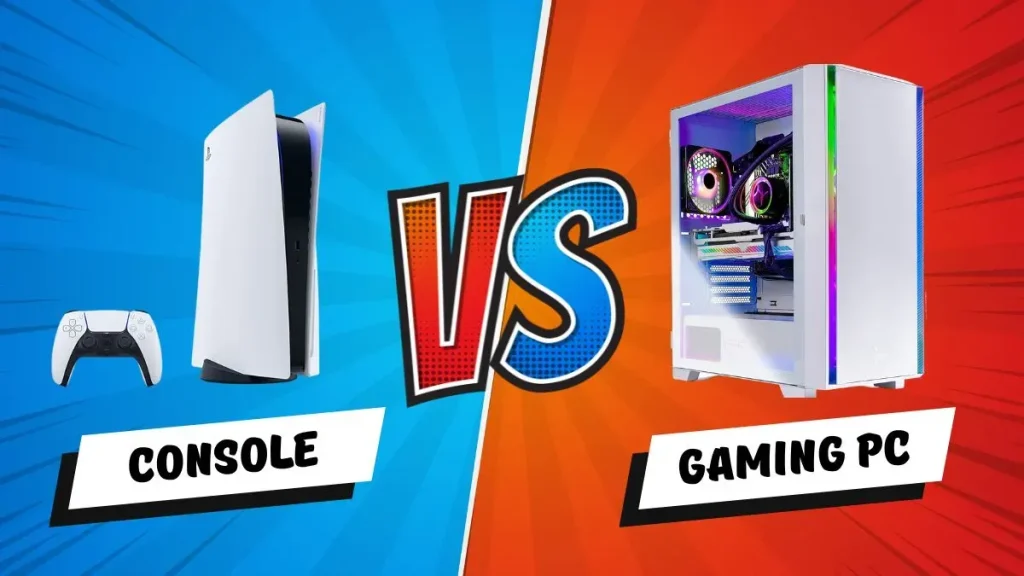When weighing options like Console vs PC gaming, you’ll consider how each path fits your living room, budget, and long-term gaming habits. A console offers plug-and-play simplicity and consistent performance, while PC gaming promises higher frame rates and deeper customization—a PC gaming performance comparison that many players study. You’ll encounter differences in exclusive games on PC vs console, cost models, and the potential for future upgrades that affect long-term value. In practice, console vs PC gaming advantages can show up in input latency and frame rates, which determine how responsive a title feels. Ultimately, this guide helps you weigh cost aspects—console gaming cost vs PC—alongside performance and library breadth so you pick the path that keeps you playing.
Seen through an LSI lens, the discussion shifts from devices to ecosystems: console-centric gaming versus PC-based gaming. Concepts like living-room setup, desktop rig, graphics fidelity, upgrade cycles, and exclusive titles help describe the tradeoffs without relying on a single brand. By weaving related terms such as graphics performance, library breadth, modding, latency, and frame rates, the piece builds context that search engines recognize while guiding readers to practical decisions.
Console vs PC gaming: A balanced look at advantages and trade-offs
Understanding the strengths of each path helps you choose without ruling out future changes. Not every gamer needs the bleeding-edge rig; some prioritize stability, simplicity, and a strong library of titles. When weighing console vs PC gaming advantages, consider how you play, where you game, and how much you’re willing to upgrade over time.
Whether you favor the couch-friendly, plug-and-play experience of a console or the open-ended customization of a PC, your daily routine shapes what feels most valuable. Load times, availability of multimedia features, and how much tinkering you’re comfortable with all influence the final decision.
Performance and visuals: PC gaming performance comparison vs consoles
PC gaming performance comparison often shows higher potential for frame rates, 4K textures, and ray tracing when paired with a capable GPU, CPU, and fast storage. Enthusiasts chase every last frame and fidelity, leveraging features like DLSS or FSR to balance quality and speed.
Consoles deliver stable, optimized performance with a streamlined software stack, providing a smooth out-of-the-box experience for most players who don’t want to chase upgrades. The choice often hinges on whether you value top-end visuals or consistent, maintenance-free gaming.
Cost and value: console gaming cost vs PC
Cost is not just the sticker price; it’s how the money flows over time. Console gaming cost vs PC frames the debate around a predictable upfront purchase, bundled games, and online services. For many, the upfront simplicity is appealing, even if long-term costs accumulate in subscriptions and hardware refreshes.
PC builds can be expensive upfront, but their long-term value comes from a single platform supporting many games, productivity apps, and potential hardware upgrades without buying an entirely new system. If you’re strategic about components and timing, PC gaming can offer a favorable total cost of ownership over several years.
Exclusive games on PC vs console
Exclusive games on PC vs console shape the library you’ll access at launch and over time. Consoles often boast strong exclusives that keep fans tied to a single ecosystem for a period or longer, influencing a buyer’s platform loyalty.
PC exclusives, a broad catalog of indie titles, and a robust modding community extend game lifespans, letting players tailor experiences with mods, community-made content, and custom configurations that aren’t always possible on console.
Input latency, frame rates, and control precision
Input latency, frame rates, and control responsiveness can determine competitiveness in fast-paced genres. PC setups with higher refresh-rate monitors and precise keyboard-mouse input often minimize latency and maximize accuracy.
Consoles have made significant strides in responsiveness and controller ergonomics, delivering consistent performance across a broad library. The decision may come down to whether you prioritize precision (PC) or comfort and couch-friendly play (console).
Experience and ecosystem: ease of use and long-term maintenance
Experience and ecosystem go beyond hardware; they include storefronts, friend lists, and curated content. Consoles emphasize turnkey setups, automatic updates, and a cohesive, living-room-friendly environment that many players value for its predictability.
PC ecosystems reward customization and ownership—from graphics settings to peripheral calibration and software control. You’ll enjoy more flexibility and potential for mods, but with that comes the need to manage drivers, backups, and system maintenance.
Upgrade paths and future-proofing for PC and consoles
Upgrade paths and future-proofing are central to the decision. Consoles lock you into a fixed lifecycle, simplifying budgeting but requiring a new purchase when the hardware ages.
PCs are designed for incremental upgrades, allowing you to swap GPUs, add memory, and expand storage without replacing the entire system. Plan for compatibility and power needs to maximize your long-term performance gains.
Modding, customization, and the PC advantage in content creation
Modding and community-made content are hallmarks of PC gaming. If you enjoy tweaking visuals, balancing gameplay, or adding new tools, the PC scene often delivers deeper customization and experimentation.
Indie games, ports, and user-generated content flourish on PC, offering a wider variety of experiences that may not appear on consoles. Ongoing discounts, bundles, and community mods can extend the value and freshness of your library.
Multiplayer, online services, and couch co-op differences
Multiplayer experiences and online services differ between platforms. Console ecosystems emphasize ease of access, friend networks, and integrated services, while PC players may rely on a mosaic of launchers and platforms for social gaming.
Both paths host robust communities and competitive scenes; your preference for keyboard/mouse versus controller, cross-play, and the size of your preferred communities will influence which route feels more social and engaging.
Making your choice: a practical decision guide
Making your choice doesn’t require a rigid rule. Start with your favorite genres, play style, and budget, then map these to the strengths of each platform. A clear framework helps you predict what you’ll enjoy most over the next few years.
Some gamers even blend both worlds—using a console for living-room convenience and a mid-range PC for strategy titles, emulation, and PC-only experiences. The best path is the one that keeps you playing the games you love with the least friction.
Frequently Asked Questions
What are the console vs PC gaming advantages and console gaming cost vs PC considerations for someone weighing simplicity, price, and game libraries?
Console vs PC gaming advantages include a plug‑and‑play experience with predictable upfront costs, bundled libraries, and living‑room convenience. A modern console delivers stable performance with minimal setup and fewer surprises, while offering popular exclusive titles and a straightforward online experience. PC gaming, by contrast, emphasizes upgradeability, higher potential frame rates and sharper graphics (with DLSS/FSR), and a broader library including mods, indie games, and productivity use. When you weigh console gaming cost vs PC, your choice often boils down to whether you value ease and a fixed total spend or long‑term flexibility and maximum visuals.
How do input latency and frame rates compare in console vs PC gaming, and what should you consider for competitive play?
Input latency and frame rates are often the biggest differentiators in console gaming vs PC gaming. Consoles provide smooth, reliable 60fps (with improvements in newer hardware) and a consistent experience, which is nice for casual play. PC gaming can offer higher frame rates and lower latency on high‑refresh monitors with keyboard/mouse input, which benefits precision shooters and RTS titles. If speed and responsiveness matter most, a PC with a fast display often edges out a console; for simplicity and couch gaming, a current-gen console remains very capable.
| Aspect | Key Points |
|---|---|
| Performance | Consoles offer stable visuals (often 60fps) with optimized software and plug‑and‑play ease; newer generations push higher resolutions and lighting. PCs provide higher frame rates, 4K textures, faster load times, and advanced features like ray tracing, DLSS/FSR, but may require upgrades for peak results. |
| Cost & Long-Term Value | Consoles have a predictable upfront cost with bundled games and built‑in online services; long‑term costs come from subscriptions and occasional hardware refreshes. PCs usually cost more upfront but can be economical over time via sales and broad usage beyond gaming; upgrades split the expense over years. |
| Game Library, Exclusives & Modding | Consoles tend to have strong exclusives and curated libraries; PC offers a vast catalog, indie gems, and robust modding communities that extend game life, including mods and emulation. |
| Input Methods | Consoles rely on controllers for couch gaming; PC uses keyboard and mouse for precision in shooters and strategy games; high refresh rates can reduce latency. |
| Experience & Ecosystem | Consoles provide a turnkey, living-room friendly experience with cohesive online services and streamlined content. PCs offer deep customization, hardware flexibility, and strong modding ecosystems. |
| Upgrades & Longevity | Consoles follow a fixed lifecycle (~6–7 years) with new generations. PCs are upgradeable (GPU, RAM, storage) but require planning; upgrades enable continued performance gains. |
| Decision Guidance | Consider what games you love, whether you value simplicity or customization, your performance needs, budget, and willingness to upgrade. A blended approach (console for living room, PC for PC‑exclusive titles) can work well. |
Summary
Console vs PC gaming is about choosing the environment that best matches your gaming passions, budget, and lifestyle. Consoles provide a reliable, user-friendly gateway to a rich library of games with a simple setup and predictable costs, while PC gaming offers unparalleled performance potential, a vast library, and a platform for modding and customization, with the caveat of potential upgrades and a steeper learning curve. Ultimately, the best choice is the one that keeps you playing more of the games you love, without breaking your budget or complicating your setup. Whether you lean toward Console vs PC gaming or blend both worlds, the important thing is to stay immersed, entertained, and connected to the games and communities you care about.



